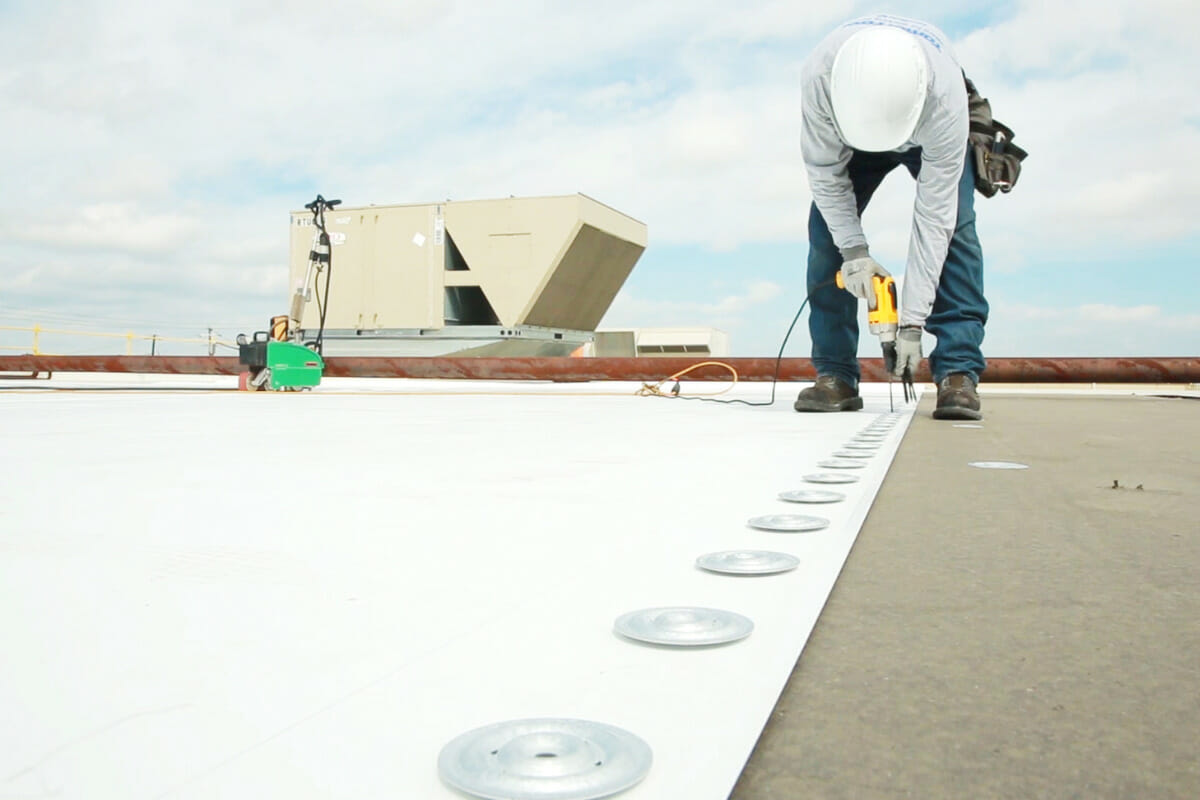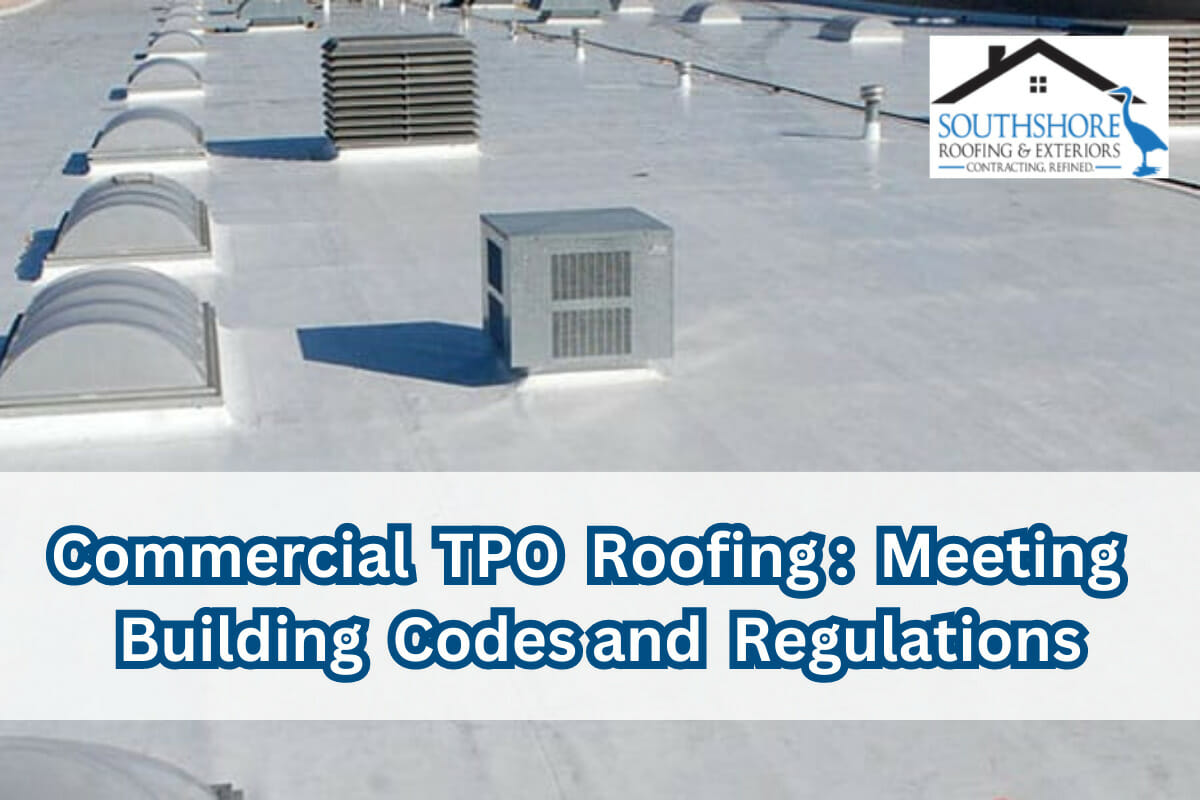Being a business owner is not an easy task, and between juggling a thousand things on your to-do list, we know that the general health of your building or commercial space is not always your priority. But there is one critical aspect that should not be overlooked: the roofing system. A well-maintained and high-quality roof is essential for the protection and longevity of the business. In this article, we will focus on the significance of commercial roofing and how investing in reliable and durable roofing types, such as TPO, can alleviate some of the burdens faced by busy business owners.
Today we will cover how TPO complies with building codes in Florida and the advantages it offers.
What Are Building Codes And Why Are They Necessary?
Building codes and regulations play a crucial role in ensuring the safety, integrity, and compliance of commercial roofing systems. These codes are established by local authorities and regulatory bodies to set standards for construction practices, materials, and performance requirements.
In the U.S., there are two major codes and compliances that you need to know about: the International Building Code (IBC) and the International Residential Code. Along with general codes, each state and municipality has its own building codes. Check if any local laws and building codes exist for your town, in addition to your state guidelines, before starting any roofing project.
In this section, we will discuss the significance of building codes and regulations for commercial roofs in Florida, and explore some of the key considerations.
Safety
Building codes prioritize the safety of occupants, contractors, and the general public. They provide guidelines to prevent accidents, ensure structural stability, and minimize risks associated with fire, extreme weather, and other hazards.
Compliance
Compliance with building codes is mandatory and enforced by local authorities. Failure to adhere to these regulations can result in penalties, delays, or even the shutdown of a project.
Uniformity and Consistency
Building codes establish a common set of standards, ensuring consistency in construction practices across different jurisdictions. This promotes accountability and facilitates communication between contractors, architects, and building inspectors.
What Is A TPO Roof?
Commercial TPO roofing has gained significant popularity in the construction industry due to its numerous advantages and cost-effectiveness. TPO, which stands for thermoplastic olefin, is a type of single-ply roofing membrane known for its durability, flexibility, and energy efficiency.
It is primarily used on flat-roof buildings and is known for its excellent performance in various climates and weather conditions. TPO roofing membranes are typically made from a blend of polypropylene and ethylene-propylene rubber, offering a combination of flexibility, strength, and resistance to UV radiation.

TPO And Building Codes
When it comes to commercial roofing, meeting building code compliance is of the utmost importance.
Fire Resistant Material
Building codes often include specific requirements for the fire resistance of roofing materials. TPO excels in this aspect, as it is manufactured with fire-retardant additives and meets stringent fire resistance standards.
Structural Considerations
Commercial roofs must meet specific structural load capacities to ensure the overall stability and safety of the building. TPO, being lightweight yet durable, puts less stress on a building. Its flexibility allows it to accommodate building expansion and contraction without compromising its integrity.
Cool Roof Compliant
Some regions have specific regulations or incentives for cool roofs, which aim to reduce heat emissions from urban areas and promote energy efficiency. TPO, particularly white TPO roofing membranes, qualify as cool roofs due to their high solar reflectance.
Please note that for more specific information or any amendments related to TPO roofing in Florida, it is recommended to consult the appropriate local building authorities or ask your local roofing contractor.
Advantages Of TPO Roofing Systems
TPO is a relatively new material and has made rapid strides. This material is not only an appropriate choice for your Tampa business as it meets most of the flat roof building codes and regulations, but also because of its other advantages.
Highly Energy Efficient
TPO roofs are known for their exceptional energy efficiency, making them a popular choice for commercial buildings seeking to reduce cooling costs and improve sustainability. One of the key factors contributing to their energy efficiency is their heat-reflective properties.
TPO roofing membranes are designed with light-colored surfaces that effectively reflect solar heat away from a building. Unlike darker roofing materials that absorb heat, TPO roofs can reflect a significant amount of solar radiation, helping to maintain a cooler interior environment. This heat-reflective characteristic reduces the reliance on air conditioning systems, leading to substantial energy savings.
Flexible
Flexibility is a key attribute of TPO roofing membranes, making them an ideal choice for commercial buildings that experience structural movement. Unlike rigid roofing materials that may crack or split under stress, TPO membranes are designed to be highly flexible, allowing them to adapt to the expansion and contraction of a building without compromising its performance or integrity.
Easy To Install
When it comes to commercial flat roofing materials, the ease of installation is a concern. TPO is a lightweight material that comes in wide, broad rolls, making it easier to install than its counterparts. When commercial properties have new roofs installed, they generally have to shut down for a few days during construction. Because TPO roofing systems have a simplified installation, the job is often done quickly so you can get back to business as usual.
Environment Friendly
TPO roofs not only offer energy efficiency benefits but also stand out as an environmentally friendly roofing option. One significant aspect of its eco-friendliness is its composition, as TPO membranes do not contain chlorine or any ingredients derived from chlorine-based compounds. This chlorine-free characteristic sets TPO apart from some other roofing materials, such as PVC (polyvinyl chloride), which often contains chlorine.
Furthermore, TPO is fully recyclable, making it a sustainable choice. At the end of its lifespan, TPO roofing materials can be collected and recycled into new roofing products.
Has An Aesthetic Appeal
TPO roofing not only offers practical benefits but also provides aesthetic versatility, allowing building owners to enhance the visual appeal of their structures.
Unlike some roofing materials that are limited in color options, TPO membranes are available in a variety of colors, including white, black, and gray, among others.

Drawbacks of TPO Roofs
While TPO roofing has many benefits, there are also some drawbacks to keep in mind. So before you decide to install the material, consider the following things:
New In The Industry
Industries such as roofing thrive on experience, and a roofing material that has been around for decades will generally get more attention, and be trusted, by property owners. Since it was only introduced in the 90s, TPO is a relatively new roofing material and therefore, can lack the trust that owners have with other roofing materials.
Because it’s so new, the product goes through changes repeatedly and doesn’t have a proven track record yet. This means that a lot about the product is still unknown and yet to be unveiled.
Lifespan Issues
Another problem a TPO roof has when you compare it to other roofing materials is its lifespan. The lifespan of a TPO roof, though durable and flexible, is around 20-30 years which is shorter than its counterpart, EPDM.
Best TPO Roofing Services In Tampa, Florida
When it comes to choosing a roofing contractor for your commercial building, it is important to choose experienced roofing contractors who are familiar with TPO roofing services in Tampa. This is where our team at SouthShore Roofing & Exteriors can come to your help. We are experienced commercial roofing contractors that have helped a lot of commercial roof owners through the years. We are partnered with some of the best TPO roof manufacturers in Tampa and have years of training so you need not worry about the quality of workmanship. So what are you waiting for? Contact us today at (813) 400-3329 to get started on your project.
FAQs About TPO Roofing
A. The cost of a TPO roofing system will vary depending on the size and scope of your project. However, it typically costs around $4-$14 per square foot.
A. Yes, TPO roofs are designed to be fire-resistant.
A. The best way to determine if a TPO roof is right for your business is to consult with a licensed roofing contractor in Tampa. They will be able to assess your needs and recommend the best roofing solution for your business.




